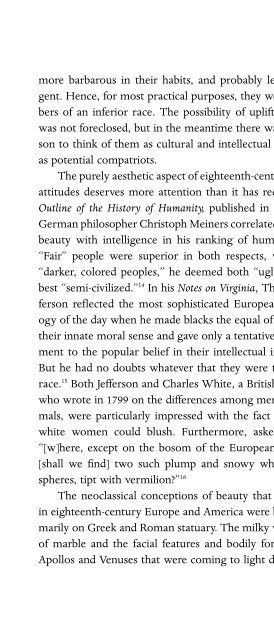Racism - A Short History - George M Fredrickson.pdf - WNLibrary
Racism - A Short History - George M Fredrickson.pdf - WNLibrary
Racism - A Short History - George M Fredrickson.pdf - WNLibrary
Create successful ePaper yourself
Turn your PDF publications into a flip-book with our unique Google optimized e-Paper software.
THREE Climax and Retreat<br />
countries like the United States and Great Britain reluctant<br />
to accept many Jewish refugees from Germany before the<br />
outbreak of the war, and it was hard for them to believe<br />
the first accounts of “the final solution” that appeared in<br />
1942–1943. But the horrible truth revealed by the liberation<br />
of the death camps in 1945 could not be evaded. The resulting<br />
shock and mortification did more to discredit racism—at<br />
least in its blatant ideological forms—than had any<br />
previous historical event. As a consequence of the Allied<br />
victory over the Nazis in World War II, according to the<br />
German philosopher Jürgen Habermas, “the rug was<br />
pulled out from under all claims to legitimacy that did not<br />
at least rhetorically embrace the universalistic spirit of the<br />
political Enlightenment.” 48 What the Nazis had done was<br />
so indefensible that later neo-Nazis would deny that the<br />
Holocaust had taken place rather than try to justify it.<br />
The eugenics movement, which had enjoyed scientific<br />
respectability in the United States and Britain before the<br />
war, did not survive the revelations of what the Nazis had<br />
done in its name. Not all eugenicists had been racists or<br />
even social conservatives, but the whole notion of using the<br />
state to improve the human gene pool was under a dark<br />
cloud for several decades after the war. The empirical genetic<br />
science of 1950 was not very different from that in<br />
1940, when the possibility that there were innate differences<br />
between races, and that crossing them might have<br />
deleterious consequences, was still a respectable hypothesis.<br />
But in 1950 most prominent geneticists and physical<br />
anthropologists endorsed all or part of the UNESCO statement<br />
declaring that science gave no support to the notion<br />
that human groups differed in “their innate capacity for<br />
128
















